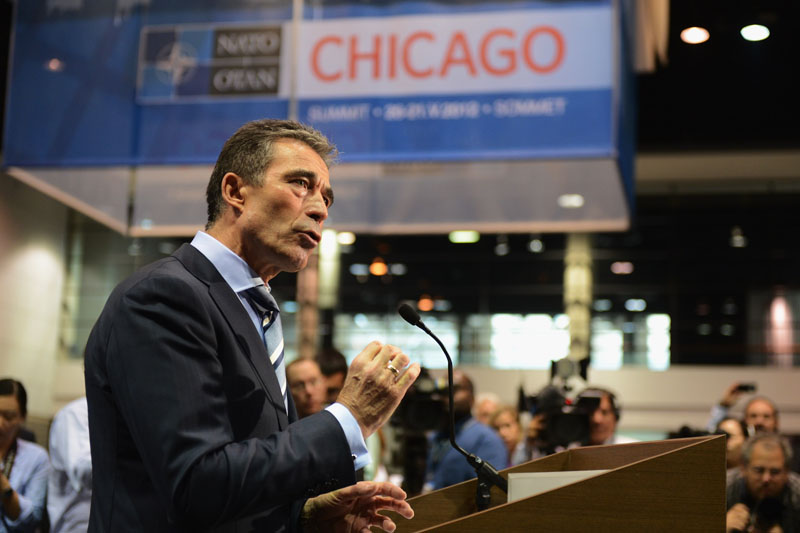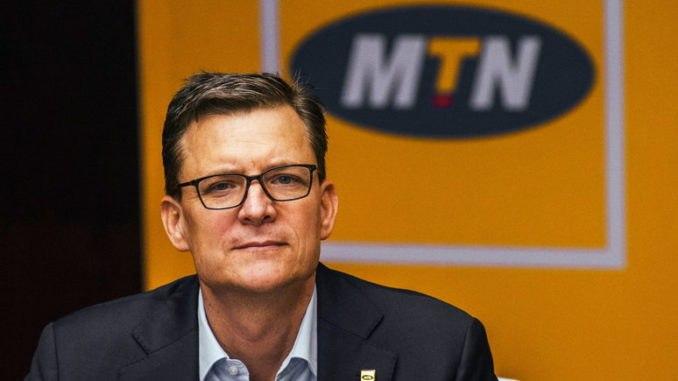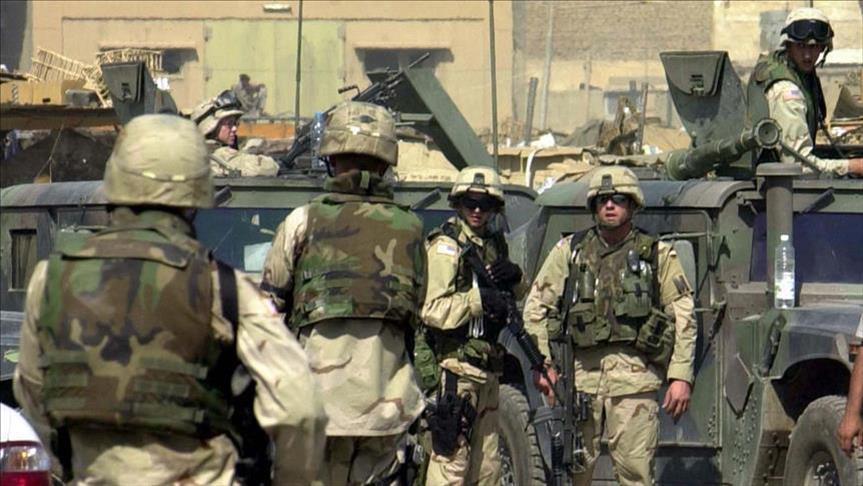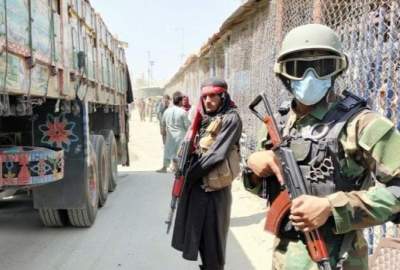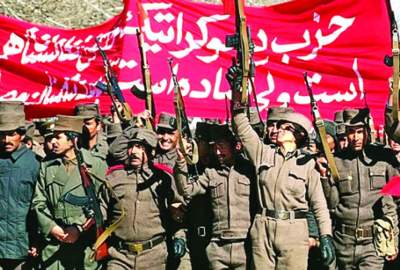The United States and NATO leaders insist the Afghanistan fighting coalition will remain whole despite France’s plans to yank combat troops out early, but leaders wary of plummeting public support for the war are using an alliance summit Sunday to show they want to move quickly away from the front lines.
With a global economic crisis and waning public support for the war in the backdrop, world leaders were opening the NATO summit to tackle Afghanistan’s post-conflict future — from funding for security forces to upcoming elections.
President Obama and Afghan President Hamid Karzai were meeting Sunday on the sidelines of the summit. Their hour-long discussion was expected to focus on planning for Afghanistan’s 2014 elections, as well as the prospect of a political settlement with the Taliban, a senior Obama administration official said.
Public opinion in Europe and the United States is solidly against the war, with a majority of Americans now saying it is unwinnable or not worth continuing.
Newly elected French President Francois Hollande has said he will withdraw all French combat troops from Afghanistan by year’s end — a full two years before the timeline agreed to by nations in the U.S.-led NATO coalition.
“There will be no rush for the exits,” NATO Secretary General Anders Fogh Rasmussen said. “Our goal, our strategy, our timetable remain unchanged.”
Rasmussen said that new position does not indicate fresh cracks in the alliance. He suggested a deal will emerge for France to move into a noncombat role but continue to support the international mission.
Karzai has said repeatedly he will step down from power when his term ends in 2014, paving the way for new elections. NATO’s scheduled end of the war was built around those plans, with foreign forces staying until the 2014 election but exiting the country by 2015.
Obama and Karzai will discuss ways to ensure that political rivals can compete fairly in the run-up to the election, as well as ways to reduce fraud and support the winner who emerges, the official said.
Past Afghan elections were riddled with irregularities, and the U.S. applied heavy pressure to Karzai to schedule a second round of voting during the last presidential contest in 2009. The runoff was never held because Karzai’s challenger pulled out in protest of what he claimed was an impossible level of corruption.
The election chapter opened a rift between the U.S. and Karzai, who suspected that the Obama administration wanted to replace him.
The Obama administration has mostly repaired its relationship with Karzai, but mistrust remains on both sides.
The U.S. official, speaking on condition of anonymity to discuss sensitive diplomacy, said Obama and Karzai also plan a lengthy discussion of prospects for a political settlement or peace pact between Karzai’s government and the Taliban-led insurgency. The Taliban pulled out of U.S.-led talks in March, but separate talks among Afghan and other contacts continue, the U.S. official said.
The official said Obama would press his view that political reconciliation is essential to the country’s future security.
The Taliban is urging nations fighting in Afghanistan to follow France’s lead and pull their international forces from the war this year.
“We call upon all the other NATO member countries to avoid working for the political interests of American officials and answer the call of your own people by immediately removing all your troops from Afghanistan,” the group said in a statement emailed to reporters ahead of the summit opening.
The insurgent group noted declining public support for the war in the West and said political leaders should listen to their constituents and get out of Afghanistan.
The national security-focused NATO summit caps an extraordinary weekend of international summitry. Obama and the leaders of the world’s leading industrial nations convened at Camp David, the presidential retreat in Maryland, for two days of talks focused in large part on Europe’s economic crisis.
“I do hope that we will see a reopening of the transit routes in the very near future,” Rasmussen said. “These negotiations will continue, but I am hopeful that they will be concluded in a positive manner.
With a global economic crisis and waning public support for the war in the backdrop, world leaders were opening the NATO summit to tackle Afghanistan’s post-conflict future — from funding for security forces to upcoming elections.
President Obama and Afghan President Hamid Karzai were meeting Sunday on the sidelines of the summit. Their hour-long discussion was expected to focus on planning for Afghanistan’s 2014 elections, as well as the prospect of a political settlement with the Taliban, a senior Obama administration official said.
Public opinion in Europe and the United States is solidly against the war, with a majority of Americans now saying it is unwinnable or not worth continuing.
Newly elected French President Francois Hollande has said he will withdraw all French combat troops from Afghanistan by year’s end — a full two years before the timeline agreed to by nations in the U.S.-led NATO coalition.
“There will be no rush for the exits,” NATO Secretary General Anders Fogh Rasmussen said. “Our goal, our strategy, our timetable remain unchanged.”
Rasmussen said that new position does not indicate fresh cracks in the alliance. He suggested a deal will emerge for France to move into a noncombat role but continue to support the international mission.
Karzai has said repeatedly he will step down from power when his term ends in 2014, paving the way for new elections. NATO’s scheduled end of the war was built around those plans, with foreign forces staying until the 2014 election but exiting the country by 2015.
Obama and Karzai will discuss ways to ensure that political rivals can compete fairly in the run-up to the election, as well as ways to reduce fraud and support the winner who emerges, the official said.
Past Afghan elections were riddled with irregularities, and the U.S. applied heavy pressure to Karzai to schedule a second round of voting during the last presidential contest in 2009. The runoff was never held because Karzai’s challenger pulled out in protest of what he claimed was an impossible level of corruption.
The election chapter opened a rift between the U.S. and Karzai, who suspected that the Obama administration wanted to replace him.
The Obama administration has mostly repaired its relationship with Karzai, but mistrust remains on both sides.
The U.S. official, speaking on condition of anonymity to discuss sensitive diplomacy, said Obama and Karzai also plan a lengthy discussion of prospects for a political settlement or peace pact between Karzai’s government and the Taliban-led insurgency. The Taliban pulled out of U.S.-led talks in March, but separate talks among Afghan and other contacts continue, the U.S. official said.
The official said Obama would press his view that political reconciliation is essential to the country’s future security.
The Taliban is urging nations fighting in Afghanistan to follow France’s lead and pull their international forces from the war this year.
“We call upon all the other NATO member countries to avoid working for the political interests of American officials and answer the call of your own people by immediately removing all your troops from Afghanistan,” the group said in a statement emailed to reporters ahead of the summit opening.
The insurgent group noted declining public support for the war in the West and said political leaders should listen to their constituents and get out of Afghanistan.
The national security-focused NATO summit caps an extraordinary weekend of international summitry. Obama and the leaders of the world’s leading industrial nations convened at Camp David, the presidential retreat in Maryland, for two days of talks focused in large part on Europe’s economic crisis.
“I do hope that we will see a reopening of the transit routes in the very near future,” Rasmussen said. “These negotiations will continue, but I am hopeful that they will be concluded in a positive manner.
Source : Afghan Voice Agency (AVA), International Service
